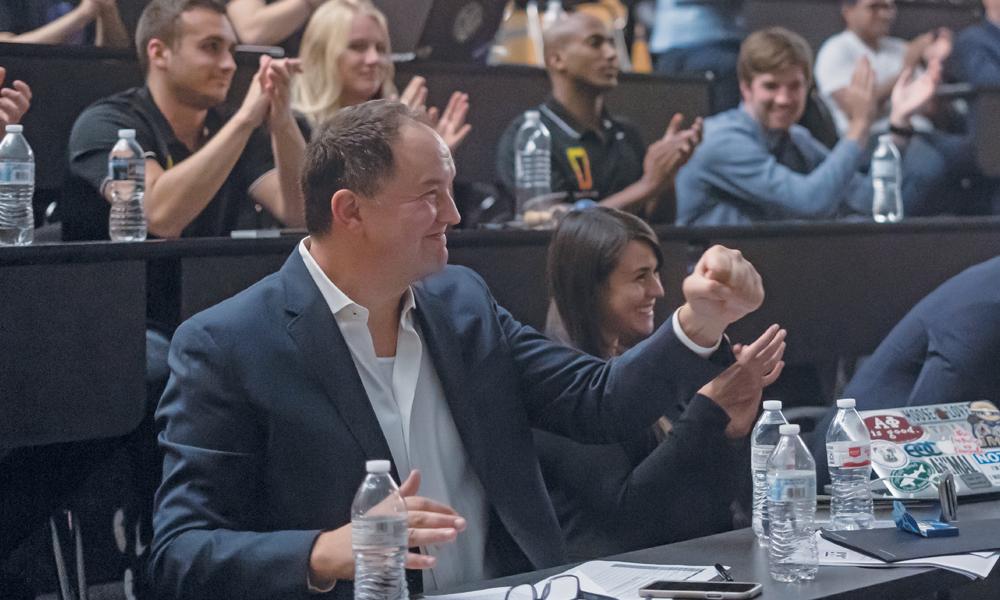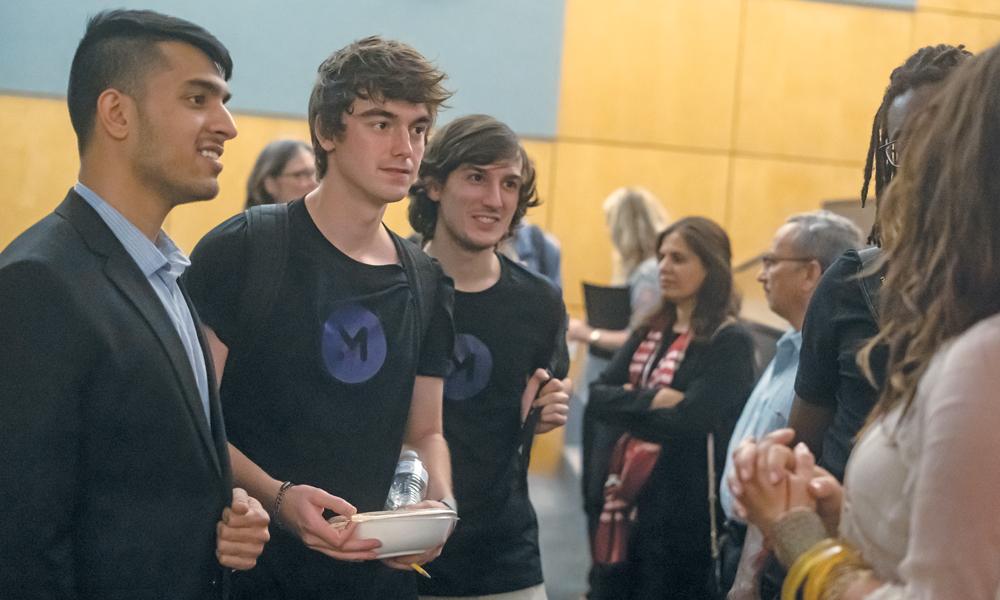Gaining traction
Summer Venture Accelerator strengthens student startups
BusinessSUMMARY: The Leslie Flanary Gilliam ('82) Center for Entrepreneurship at JMU provides the mortar to help build student ventures into strong startups through its Summer Venture Accelerator.
from the Winter 2019 issue of Madison
By Stephen Abramowitz
The early stages of creating a business are not so much paved as they are built brick by brick. The Leslie Flanary Gilliam ('82) Center for Entrepreneurship at JMU provides the mortar to help build student ventures into strong startups through its Summer Venture Accelerator. The eight-week summer program serves as a launch pad for student startups of all kinds. Each venture is comprised of an interdisciplinary team of students paired with experienced mentors.
In 2018, nine ventures were selected to embark on a comprehensive learning experience. The students were challenged to transform their fragile ideas into pitch-ready business models that could withstand scrutiny during the program’s final presentations in September and attract outside investment.
The results speak for themselves. This year’s ventures have raised over $9 million in pledged investments thus far.
 |
| Patrick McQuown, executive director of the Leslie Flanary Gilliam ('82) Center for Entrepreneurship, shows his support for the student ventures. |
“The startup program has been really helpful for me because I’m not a business major,” says Thomas Driver (’18), co-founder of Drive Fitness. “I have a technical background, and the other guys on my team are developers. So for me, I was able to work with a lot of business majors, and they were able to help me with my marketing, my business strategy and my finances.”
Driver and co-founder Matthew Dromazos (’18) paired with an outside company, Shapelog, to create a mobile platform designed to automatically record a user’s strength-training workouts by placing smart sensors within the tension cables of weight machines. The venture incorporates competitive elements such as leaderboards and challenges that users can share with friends.
As Driver and Dromazos continue to build their company, the recent graduates hope to turn their venture into a full-time career.
Some ventures’ founders embody their brands.
Dan Lambert, founder and CEO of DyeHappy, is known within the JMU community as “Tie-Dye Dan.”
“I am the first branded tie-dye clothing line in the history of the world,” Lambert says. “I offer high-end tie-dye with a name brand feel.” The senior communication studies major, whose personality is as bright as his company’s apparel, is expanding his lifestyle brand into the skill toy market.
For those who opt in to the accelerator program, by the time they reach the final pitch, their companies look and feel completely different.
“We came in with just an idea and a domain name,” says Josh Clements, an engineering major and co-founder of the Play Well Foundation, which creates adaptive musical instruments for individuals with disabilities.
Clements says one of Play Well’s primary focuses has been gaining traction—what entrepreneurs refer to as getting people to buy into a company’s products or services.
“Until traction occurs, it’s just an idea,” says Patrick McQuown, executive director of the Center for Entrepreneurship. “That and $2.25 will get you a cup of coffee. Take away the $2.25 and you’re not getting a coffee.”
 |
| Students are prompted to bring in mentors who have startup expertise specific to their venture's industry. |
For McQuown, a serial entrepreneur with over 20 years of startup experience, the Venture Creation Fellowship is his own form of a startup, and he is determined to see it grow. “You’re here to build or sell your venture,” he says. “That’s what we talk about from day one.”
The center has invested in a handful of student ventures by offering team members a stipend, along with a grant, to help turn their ideas into viable enterprises.
Before the final showcase, the ventures were given multiple opportunities to compete in pitch-off competitions against other entrepreneurs. This year’s cohort went head-to-head with Princeton University’s eLab Summer Accelerator. JMU’s venture, BarTrack, was victorious over the Ivy League school’s TerraVuze startup. BarTrack’s patent-pending smart-tap technology promises to fix over-foaming during beer pours. The award-winning venture was founded by recent graduates Brett Danielson (’18), Hunter Markle (’18) and Grant Hobar (’18) and senior Neth Gardner.
“We actually helped other companies with their software,” says Driver. “For BarTrack, we helped them build a website dashboard and really traded business insights.”The Summer Venture Accelerator is as collaborative as it is competitive. Students are prompted to work with colleagues from other disciplines to refine their ideas and ensure their mutual success.
|
'If you are into startups or tech entrepreneurship, you have to be here.' — Chiedo John ('13), CEO, Chiedo Labs |
Participants are also encouraged to bring in mentors who have startup expertise specific to their venture’s industry. Since the program’s inception, several local entrepreneurs have volunteered their time and effort to assist ventures and help teams prepare for the final pitch.
It didn’t take long for entrepreneurs within the Harrisonburg community to take note of the program’s potential for long-term profitability.
“For Harrisonburg’s startups, it’s the most exciting event of the year,” says Chiedo John (’13), CEO of the custom web development agency Chiedo Labs. “If you are into startups or tech entrepreneurship, you have to be here.”
Chiedo worked directly with integrated science and technology major Ted Reynolds, the co-founder of Matter Music, a venture aimed at revolutionizing the music industry.
As consumers have shifted from purchasing albums to digital streaming, many artists are taking a hit, Reynolds explains. “We have a solution using cryptonomics and block-chain (technology) to essentially manufacture a system model where we can pay artists two to three times more than what they would be paid on traditional platforms.”
Dave Urso, dean of academic affairs at Blue Ridge Community College, also volunteers with the program. “Chiedo’s perspective is the technical side, and mine is the sales piece,” Urso says. “So what we try to do is to help them to build out that story and tell it in a compelling way. It’s grinding the coal down to get to the diamond.”
No one understands this quite like the founders of HICH, a ride-sharing platform designed to eliminate surge pricing by empowering student riders and drivers. With the help of full-time developer Jeremy Francis, the startup’s student co-founders, Zac Casey and Trey Rustand, have completely transformed their business as well as themselves. The company is set to unveil its beta application to the app store this winter.
“We believe as a team that if we are the smartest people in the room, then we are in the wrong room,” Rustand says. “We are all about surrounding ourselves with people who make us rise to the occasion and become better.”
While the accelerator program has received national recognition and unprecedented financial success, McQuown believes it has yet to reach its full potential.
“Just because we made money doesn’t mean we have achieved success,” McQuown says. “That’s the first thing we say in programming. It’s great you did it, but now you have to execute. Now we need to see how these ventures do after they raised the money.”


